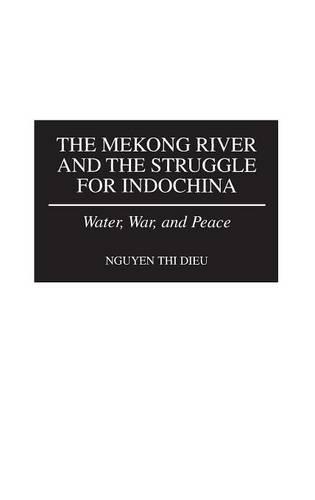
The Mekong River and the Struggle for Indochina: Water, War, and Peace
(Hardback)
Publishing Details
The Mekong River and the Struggle for Indochina: Water, War, and Peace
By (Author) Nguyen Thi Dieu
Bloomsbury Publishing PLC
Praeger Publishers Inc
30th January 1999
United States
Classifications
Tertiary Education
Non Fiction
Environmental management
Anthropology
Ethnic studies / Ethnicity
333.91620959
Physical Properties
Hardback
280
Description
The Mekong River links together the mainland countries of Southeast Asia in a vital geographic, but also economic and political, unit. Its historical trajectory coursed through kingdoms and colonies, and its physical presence and symbolism became more acute as it came closer to modern times. Tracing the history of the Mekong River, this book aims to show how its conceptualizations have been transformed in modern times, and particularly during the Vietnam War when the Mekong River and Mekong Project became political pawns. In the 1950s, the decision was made to develop the river's resources to foster economic development for the four countries of the lower Mekong basin. The Mekong Project, as it came to be known, proposed the construction of a set of major dams on the mainstream and of numerous smaller ones on the tributaries to bring hydropower, flood control, irrigation and other benefits to the riparian countries. The Project, however, was subverted to the needs of the Vietnam war. With the return of peace, the Mekong countries can re-examine the future of the river and its potential impact on the region. Nguyen concludes by examining the continuation of some of the Project's schemes by the independent Southeast Asian countries and regional powers. Scholars and researchers interested in Southeast Asian history and economic development, environmental history and rural sociology should find this an important study.
Reviews
[T]he author has pieced together a nuanced discussion of the historical progress of the Mekong project.-Asian Affairs
Described as an examination of the symbolic, environmental, political and economic importance of the great Mekong River and its basin back through history to the earliest days of man.-Indochina Chronology
Her thoroughly researched and clearly written study provides important details on a number of projects and an astute assessment of the extent to which Mekong development programs have affected Thailand, Cambodia, Laos, and Vietnam.-American Historical Review
Scholars and researchers interested in Southeast Asian history and economic development, environmental history, and rural sociology will find this an important study.-The Asian Reporter
Students and scholars who want to make a case for alternatives to the nation-state or those who want to understand global implications of development in the region will find useful analysis in this work.-JAAS
The book has extensive and informative footnotes, and a selected bibliography. It will be useful to advanced undergradutes and graduate students and to a well-read public.-Choice
"The author has pieced together a nuanced discussion of the historical progress of the Mekong project."-Asian Affairs
"[T]he author has pieced together a nuanced discussion of the historical progress of the Mekong project."-Asian Affairs
"Described as an examination of the symbolic, environmental, political and economic importance of the great Mekong River and its basin back through history to the earliest days of man."-Indochina Chronology
"Scholars and researchers interested in Southeast Asian history and economic development, environmental history, and rural sociology will find this an important study."-The Asian Reporter
"Students and scholars who want to make a case for alternatives to the nation-state or those who want to understand global implications of development in the region will find useful analysis in this work."-JAAS
"The book has extensive and informative footnotes, and a selected bibliography. It will be useful to advanced undergradutes and graduate students and to a well-read public."-Choice
"Her thoroughly researched and clearly written study provides important details on a number of projects and an astute assessment of the extent to which Mekong development programs have affected Thailand, Cambodia, Laos, and Vietnam."-American Historical Review
Author Bio
NGUYEN THI DIEU is Associate Professor of History at Temple University. An expert in Southeast Asian history, she has published in the Journal of World History, Etudes Indochinoises, and Afrique-Asie.
